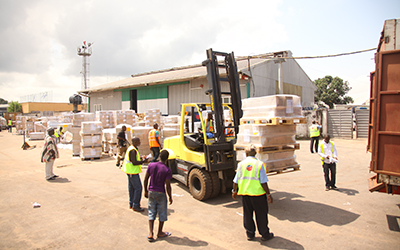Policy Brief
Firm performance, trade linkages, and the growth of SMEs in Tanzania
The private sector and enterprises have a key role to play in the development of the Tanzanian economy. This Policy Brief provides insights and solutions that could offer business sectors the vital policy support that they need to develop and grow.
Linkages with large firms provide a possibility for small and medium-sized firms (SMEs) to grow through improved productivity, competition, learning, and expansion of markets
Large firms in the manufacturing sub-sector demonstrate the highest number of linkages with SMEs — in general, however, the amount of these linkages in Tanzania is low
For many firms, such as textiles and apparel companies, global, regional, and national value chains offer distinct upgrading opportunities, but policy support is critical for success
One of the critical binding constraints limiting the growth of productivity in the Tanzanian companies is the shortage of skilled labour
How can linkages with large firms spur growth of SMEs in Tanzania?
In Tanzania, SMEs face a myriad of challenges, reflecting their weak capabilities and unfavourable business environment. Linkages with large firms provide a possibility for the growth of SMEs, through such benefits as improved productivity, competition, learning, and expansion of markets.
Currently the number of these linkages is generally low. Research results show that the manufacturing sub-sector has a higher number of linkages than other industrial sectors, reflecting the use of significant amounts of intermediate inputs. The level of production and foreign ownership appear to be the significant factors influencing the degree of linkages between large and small firms.
Analysis reveals that linkages are more effective when the initiative comes from the large firm. This implies that Tanzanian government should encourage large firms into partnerships with smaller ones.
 The government could also promote linkages with foreign firms to help the SMEs to grow, by providing tax incentives to the sectors where SMEs have significant sourcing with large firms. More generally, the government could provide fiscal incentives, for instance a rebate scheme which would enable SMEs and motivate large firms or training institutions to engage in capacity building initiatives.
The government could also promote linkages with foreign firms to help the SMEs to grow, by providing tax incentives to the sectors where SMEs have significant sourcing with large firms. More generally, the government could provide fiscal incentives, for instance a rebate scheme which would enable SMEs and motivate large firms or training institutions to engage in capacity building initiatives.
Furthermore, technology linkages are more common than other types of linkages and this strength should be fortified by promoting research and development (R&D) activities. There is a need to reinstate the R&D units that were almost mandatory in all the productive sectors in the past, and to support SMEs in technology acquisition.
Industrialization through global, regional, and national value chains in the Tanzanian textiles and apparel sector
With heightened uncertainty in the global economy, policy makers are increasingly turning from global value chains (GVCs) to regional (RVCs) and national value chains (NVCs) as drivers of structural transformation.
Tanzania’s textiles and apparel (T&A) sector as a whole has experienced economic and social upgrading in recent years, but outcomes varied with value chain directionality. While GVCs make important contributions to employment generation and export growth, RVCs and NVCs support higher-value activities such as design and branding. The latter thus serve as 'stepping stones' to more lucrative global markets.
Despite Tanzania’s privileged access to the South African market through the Southern African Development Community (SADC) regional trade agreement (RTA), the restrictive rules of origin for T&A products — which require local sourcing of inputs to qualify for duty-free trade — have resulted in negligible new investment in Tanzania. This suggests Tanzania should push for more relaxed ‘single transformation’ rules of origin in RTAs, allowing use of imported inputs to maximize investment in RVCs.
Opportunities for upgrading in T&A NVCs are constrained by low domestic prices for new and second-hand clothes, caused partly by trade policies such as low tariffs and undervaluation by customs authorities. This undermines progress towards the stated policy goal of an integrated Tanzanian ‘cotton-to-clothing’ value chain.
In this context, public procurement contracts and duty remission schemes have helped to compensate for the adverse context, and these measures should be continued.
New technology to improve productivity: opportunities and challenges in the Tanzanian textiles and garments sector
 The main leap forward for firms in low-income countries is to adopt new technology. However, severe gaps between the available technologies and best practices present challenges for the companies. For many firms in the Tanzanian T&A sector the binding constraint for higher productivity is the lack of skilled labour. This so-called absorptive capacity would be crucial in delivering the positive effect of imported technology. In fact, foreign technical experts are often hired to train local staff on the correct usage of machinery.
The main leap forward for firms in low-income countries is to adopt new technology. However, severe gaps between the available technologies and best practices present challenges for the companies. For many firms in the Tanzanian T&A sector the binding constraint for higher productivity is the lack of skilled labour. This so-called absorptive capacity would be crucial in delivering the positive effect of imported technology. In fact, foreign technical experts are often hired to train local staff on the correct usage of machinery.
Currently the scope for domestic transfer of technology is limited because local linkages between Tanzanian T&A companies are weak. The analysis however shows that the firms in southern Tanzania have more diversified linkages, which helps them to gain higher productivity.
In terms of other barriers, firms report high cost and frequent electricity cuts as a major issue. Additionally, lack of access to finance and high costs of borrowing for purchase of machinery and raw materials is a major challenge. Firms also expressed the need for greater government support, especially in facilitating capacity-building programmes, accessing finance and matchmaking with global buyers that can back firms’ ambitions to adopt the technologies in a sustained manner.
Tanzanian government should encourage large firms into partnerships with smaller ones, for instance through fiscal incentives
To enhance innovation, there is a need for the government to promote research and development (R&D) units for different industry sectors
In view of the needed transformation of the textile and apparel sector, African regional trade agreements should adopt rules which allow manufacturing from imported inputs
Tanzanian government could provide support to companies for upgrading in national value chains, for example through public procurement schemes
In light of COVID-19, companies will need immediate short-term policy support — for example through clearance of outstanding debts, waiving of interest charges on overdrafts, or through short-term loans
In light of COVID-19, short-term support will be needed to address liquidity challenges, for example through clearance of outstanding debts, the waiving of interest charges on overdrafts, and through short-term loans. In the longer term investing in skills development and fostering business to business linkages will be critical for a resilient post-COVID-19 recovery.
 Join the network
Join the network